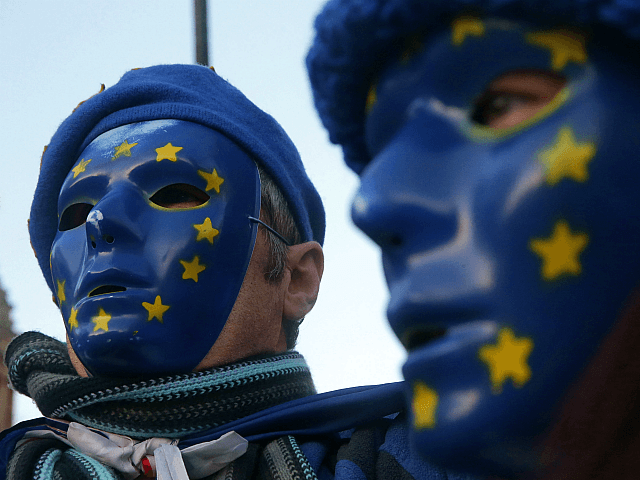A resolution of Members of the European Parliament has attacked Britain’s democratic vote to leave the European Union as a “historic mistake”, ahead of a vote to pass the UK-EU trade deal.
The European Parliament, comprised of elected politicians from regions of the EU’s 27 remaining member nations, published a motion for the resolution ahead of Tuesday’s vote, stating that “the UK’s withdrawal from the EU is a historic mistake and recalls that the EU has always respected the UK’s decision while insisting that the UK must also accept the consequences of leaving the EU and that a third country cannot have the same rights and benefits as a Member State”.
The resolution also complained of the “limited scope” of the EU-UK Trade and Cooperation Agreement because it does not include commitments from the UK on issues such as defence and foreign policy.
While Brexit leader Nigel Farage hailed the UK finally leaving the EU as “an epic triumph for the people against the political classes”, Eurocrats like former President of the European Council Donald Tusk said Brexit was “one of the most spectacular mistakes” in history. Sweden’s Foreign Minister Margot Wallström said when the UK formally left the bloc on January 31st, 2019, that she “cannot forgive them for this”, referring to British politicians, adding: “I just think that they’ve made such a historical mistake and they’ve really created a problem for all of us.”
Ireland’s Deputy Prime Minister Simon Coveney admitted at the time, however, that he thought the EU would be “weakened” because “Britain is a great country, it’s a powerful country, it’s a strong economy and it added a lot to the European Union”.
Juncker: I Could Have Stopped ‘Brainwashed’ British from Voting for Brexit https://t.co/UpnSoB3k3U
— Breitbart London (@BreitbartLondon) April 19, 2021
The deal was agreed upon by the two parties in principle on Christmas Eve. In less than a week, a Bill on the deal had moved through both chambers of the British Houses of Parliament and received Royal Assent — becoming law — in less than a week. The deal only conditionally came into force pending the authorisation of the European Parliament.
Being signed off by all relevant branches of the multi-nation bloc took longer, however.
Ambassadors from the EU’s member states “provisionally” approved the deal on December 28th, with President of the European Commission — the bloc’s powerful executive branch — Ursula von der Leyen and President Charles Michel of the European Council — comprised of the heads of state or government of the EU’s 27 member nations — signing it on the 30th.
Initial estimates put its signing by the European Parliament in January or February. However, MEPs had demanded extra time to review the deal, with the parliament later extending further due to Britain delaying Northern Ireland customs checks. The UK had then said it would not accept further obstructions to the European Parliament signing the deal beyond April 30th.
Verhofstadt: Brits Chose Brexit to Affirm Their Right to Be Stupid, Next Gen Will Rejoin EU https://t.co/2invKDSRBD
— Breitbart London (@BreitbartLondon) January 2, 2021
The European Parliament is expected to overwhelmingly back it following deliberations on Tuesday evening, with the results to be announced on Wednesday. There is still one more step: the Council of the European Union, comprised of ministers from the EU-27, must also adopt the decision following the Parliament’s agreement.
The whole Brexit process has been long in itself. Despite voting to leave the European Union on June 23rd, 2016, Article 50 — the mechanism for leaving the bloc — was not triggered until March 29th, 2017, resulting in a two-year period of withdrawal and negotiation. A satisfactory reason for the delay was not given at the time, nor has emerged since.
Due to MPs’ refusal to back Theresa May’s soft Brexit deal, the then-prime minister twice delayed Brexit until October 31st, 2019. Despite promises from her successor Boris Johnson — that he would rather be “dead in a ditch” than extend again, the Remain-dominated House of Commons forced another delay.
Following a December 2019 election that returned a Brexit-backing Tory majority, Johnson passed his deal in Parliament in January 2020, with the UK entering a transition period with the EU on January 31st — officially outside of the bloc, but still abiding by its Single Market and Customs Union rules. At 11 pm on December 31st, 2020, the transition period ended and the UK left the EU’s institutions.
‘The People’s Revolution Has Won,’ Says Farage https://t.co/NkzETSOxZX
— Breitbart London (@BreitbartLondon) January 1, 2021

COMMENTS
Please let us know if you're having issues with commenting.